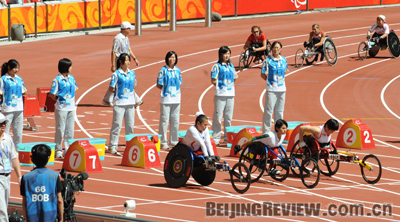|

BLUE ANGELS: Volunteers for the Paralympics show care
and compassion in helping disabled athletes
In his blue uniform and wearing a big smile on his face, Shi Xiaolei is ready to help at a moment's notice. He looks no different from any other volunteer, but there is one difference. He is deaf and he knows sign language.
Shi, 19, is a student majoring in computers at the special education school of Beijing Union University and one of the few disabled volunteers for the Beijing Olympic Games.
Among the 1.12 million who applied for Olympic volunteers, most signed up to help the Paralympians as well. In the end 40,000 were selected including some who were disabled themselves.
"I myself am disabled and there may be some things I can't do very well in my duties, but I'll use my smile to make up for it. Anyway a smile is Beijing's best name card," said Shi.
At the information desk in the National Stadium was another volunteer Lu Mengjia, who sat in an armchair due to neuromyasthenia. Her waist would ache if she sits for two or three hours and she has a steel structure to support her posture.
"She is a great person," said one of Lu's friends, "she is hard working and got herself enrolled in the prestigious Renmin University of China. She even has a doctorate in finance."
Disabled volunteer Dong Ming would show up in the VIP zone in the National Aquatics Center at 8 a.m. every day. It takes more effort to offer service in an armchair, but Dong said she never felt tired.
"I really enjoy my work," Dong said. To be part of the Olympics has been one of her dreams. "If we keep working hard, even disabled people can make themselves useful."
Dong serves as a guide, who takes the hands of the Paralympians and leads them to designated places, a job that may seem quite easy in the eyes of others. "But actually it's not that simple," said Wang Xiaohan, a volunteer from University of Science and Technology, Beijing. "I need to curve my right arm so that the left hand of the athlete can comfortably rest on it. It's more convenient and easier this way."
Wang said more patience and care is needed to assist disabled athletes, and to understand them, you need to walk in their shoes.
All the volunteers had been given special training before the Paralympics. "You'd better squat if you are talking with the armchair athletes longer than a minute. Never intervene when the athletes are dressing; when you lead the way, let the athletes hold on to your elbow." These were the notes volunteer Wang Qiang took down.
People know little about the disabled, so it is important for volunteers to interact. "We have to get close to them, to get familiar with them before we can render our service," said Zhao Jihua, an official in charge of the volunteer training.
| 